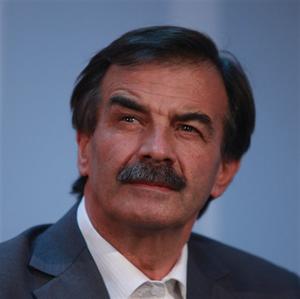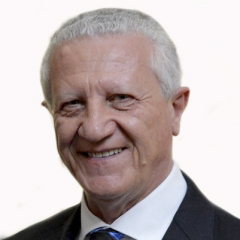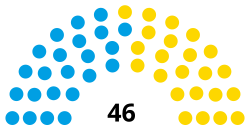
Legislative elections were held in Argentina for half the seats in the Chamber of Deputies and a third (24) of the seats in the Senate on 28 June 2009, as well as for the legislature of the City of Buenos Aires and other municipalities.

The Argentine general election of 1928 was held on 1 April, with a turnout of 80.9%.

The Chamber of Deputies of Buenos Aires Province is the lower house of the Legislature of Buenos Aires Province, the largest and most populous of Argentina's provinces. It is made up of 92 deputies elected in eight multi-member constituencies known as Electoral Sections. The number of deputies that correspond to each of the electoral sections is proportional to their population, as observed in the results of every nationwide census conducted in Argentina every 10 years. Seats may only be added to adjust the proportionality of each section, but never reduced.

The Legislature of Corrientes Province is the legislature of Salta, one of the twenty three provinces that make up Argentina. It is a bicameral body, comprising the Chamber of Deputies, and the Senate.

The Legislature of Mendoza is the local legislature of the Argentinian province of Mendoza. It is a bicameral body, comprising the Chamber of Deputies of Mendoza, and the Senate of Mendoza. It is one of eight bicameral legislatures in the country.

The Legislature of Catamarca is the local legislature of the Argentinian province of Catamarca. It is a bicameral body, comprising the Chamber of Deputies of Catamarca, and the Senate of Catamarca. It is one of eight bicameral legislatures in the country.

The Legislature of Entre Ríos is the local legislature of the Argentinian province of Entre Ríos. It is a bicameral body, comprising the Chamber of Deputies of Entre Ríos, and the Senate of Entre Ríos. It is one of eight bicameral legislatures in the country.

The Legislature of Santa Fe Province is the bicameral legislature of the Santa Fe Province, in Argentina. It comprises an upper house, the Senate, and a lower house, the Chamber of Deputies. It is one of eight bicameral legislatures in the country.

The Legislature of San Luis is the local legislature of the Argentinian province of San Luis. It is a bicameral body, comprising the 43 members of the Chamber of Deputies of San Luis, and the Senate of San Luis with 9 members. It is one of eight bicameral legislatures in the country.

The Legislature of Salta Province is the legislature of Salta, one of the twenty three provinces that make up Argentina. It is a bicameral body, comprising the Chamber of Deputies, and the Senate.

Cecilia Moreau is an Argentine politician, currently serving as National Deputy representing Buenos Aires Province since 2015, and as President of the Chamber of Deputies since 2022. She is the first woman to hold that position. Previously, from 2007 to 2011 and again in 2015, Moreau served as a member of the Buenos Aires Province Chamber of Deputies elected in the First Electoral Section.

Miguel Ángel Bazze is an Argentine politician, currently serving as National Deputy elected in Buenos Aires Province since 2011. A member of the Radical Civic Union, Bazze he sits in the Juntos por el Cambio inter-bloc in the Chamber of Deputies.

Mónica Fernanda Macha is an Argentine politician, currently serving as National Deputy representing Buenos Aires Province. A member of New Encounter, Macha was elected in 2017 for the Unidad Ciudadana coalition, and currently sits in the Frente de Todos bloc. She previously served as a member of the Provincial Senate of Buenos Aires Province.

Claudia Alicia Bernazza is an Argentine teacher, social activist and politician who served as a National Deputy elected in Buenos Aires Province on two occasions: from 2007 to 2009, when she filled in the vacancy left by Graciela Rosso, and later from 2020 to 2021, filling the vacancy left by Daniel Scioli, who was appointed Ambassador in Brazil.

Ada María Magdalena Sierra is an Argentine architect and politician who served as a National Deputy from 2017 to 2021, elected in Buenos Aires Province. A member of the Justicialist Party, she was elected in 2017 as part of Unidad Ciudadana. Sierra previously served as a member of the Buenos Aires Province Senate from 2015 to 2017, representing the Third Electoral Section. Since 2021, she has been a member of the City Council of Avellaneda, a post she previously held as well.

María Liliana Schwindt is an Argentine politician who served as a National Deputy elected in Buenos Aires Province on two occasions: she was first elected in 2013, and ran for re-election in 2017, as part of the 1País list, but was not elected. She assumed office in February 2020 in replacement of Felipe Solá. She is a member of the Renewal Front.

Jorge Emilio Sarghini is an Argentine economist and politician. Historically a member of the Justicialist Party, Sarghini has served in a number of political posts throughout his career, most notably as a member and president of the Buenos Aires Province Chamber of Deputies, as Minister of Economy of Buenos Aires Province during the successive administrations of Eduardo Duhalde and Carlos Ruckauf, and briefly as Secretary of Communications during Duhalde's interim presidency in 2002.

Adriana Cintia Cáceres is an Argentine political scientist and politician who served as a National Deputy elected in Buenos Aires Province from 2020 to 2021. She is a member of Republican Proposal (PRO).

The Senate of Buenos Aires Province is the upper house of the Legislature of Buenos Aires Province, the largest and most populous of Argentina's provinces. It comprises 43 members elected in eight multi-member constituencies known as Electoral Sections. The number of senators that correspond to each of the electoral sections is proportional to their population, as observed in the results of every nationwide census conducted in Argentina every 10 years. Seats may only be added to adjust the proportionality of each section, but never reduced.

The Chamber of Deputies of San Juan Province is the unicameral legislative body of San Juan Province, in Argentina. It comprises 36 legislators, 17 of whom are directly elected in single-member districts corresponding to the 19 departments of San Juan, and 17 of whom are elected in a single province-wide multi-member district through proportional representation.
























